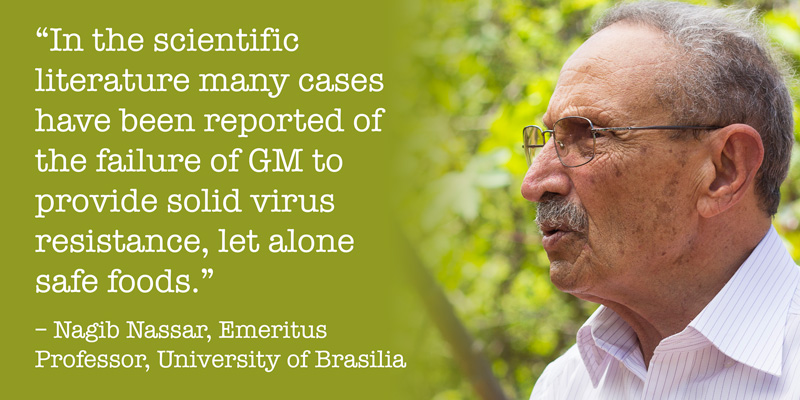
The move follows the failure of virus resistance in field trials and findings that the bean had toxic effects on rats, explains Nagib Nassar, Emeritus Professor, University of Brasilia, in an article exclusive to GMWatch
I welcome the decision of the Brazilian Corporation of Agricultural Research (Embrapa) not to commercialize its transgenic bean. The decision casts into question the position of the National Commission for Biosecurity (CTNBio), which approved its commercial release.
In an unprecedented, bold, and responsible decision, the current board of Embrapa cancelled the evaluation experiments on the transgenic beans and prevented their cultivation and consumption. This transgenic variety was developed by Embrapa and was announced with much hype three years ago.
Embrapa, a state-owned corporation affiliated with the Brazilian ministry of agriculture, verified by scientific experimentation in the field under natural conditions that the virus resistance failed.
The story of the transgenic bean has been a dramatic one since its approval three years ago. In a decision taken by fifteen members of CTNBio – including representatives from the defense, foreign affairs and other ministries – the transgenic bean was authorized for planting and consumption. Four dissenting votes, representing the ministries of health, environment, and NGOs, advocated further studies.
At the same time – in July of the same year – the Food Security Council (CONSEA) told the president of its concern over the procedures of the CTNBio decision and advised caution. It warned that the necessary biosafety studies justifying the release of the transgenic bean had not been conducted.
Moreover, the report of an expert who criticised the studies for only being based on three rats was overlooked and ignored. This number is too few to reach statistically valid conclusions on safety for consumption. Even so, all the males slaughtered before adulthood showed a trend of decreased kidney size and increased liver weight.
Also ignored was the warning of the rapporteur that biosafety legislation was being violated, since a two-generational animal study should have been carried out, but was not. Another overlooked issue was that that field studies were conducted for only two years and only in three places, when the law requires testing in all regions where the plant can be cultivated. The researcher responsible told the press that tests were done in all ecosystems – but documents submitted to CTNBio show that tests were carried out only in the greenhouse.
The virus resistance durability was questioned because the data on the first generation of seeds showed that 30% of the plants were susceptible to viruses. If this were repeated in every generation, there would be no resistance left by the fifth or sixth generation. This same result was observed in the recent trials.
The worst aspect of all this is that none of these issues put the brakes on the false hype. The launch of the transgenic bean was promoted by politicians, agronomists, molecular geneticists, and even journalists, who were attracted by the false promise. The hype escalated to the point that a Member of Congress claimed euphorically to a major newspaper that the problem of hunger and food security was now solved in Brazil.
There are many lessons to learn from the failure of the transgenic bean. One is that up to the date of releasing the variety, it cost, at today's value, more than 30 million Real (20 million dollars). One may ask: Isn’t it better and wiser to collect enough information before you begin, thereby avoiding the waste of such huge sums of money? In the scientific literature many cases have been reported of the failure of GM to provide solid virus resistance, let alone safe foods. One example was reported twelve years ago – a cassava variety engineered with the same technique to resist the mosaic virus. It cost 15 million dollars and ended up being abandoned after a few years.
The Brazilian Constitution designated ANVISA as the national authority on public health matters, but CTNBio violates its authority and ignores its opinion. Under such conditions, human health cannot be protected.